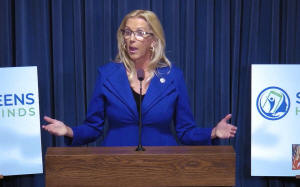|
Legislation that would have lifted a moratorium on the building
of large-scale nuclear facilities failed to get through the
Illinois General Assembly this spring.
“Nuclear energy is safe, efficient and essential for a stable
energy grid and lower costs for consumers,” said the bill’s
sponsor, state Sen. Sue Rezin, R-Morris. “It’s time to move
forward and finally end the ban on nuclear energy.”
In 2023, Illinois lifted a partial moratorium on nuclear power
development, specifically for Small Modular Reactors (SMRs).
Gov. J.B. Pritzker has said that he would be open to expanding
nuclear power in the state.
“We’re looking forward to having a bill that comes to my desk
that will allow us to expand the options for nuclear in the
state of Illinois, but it has to be done in the right way,” said
Pritzker.
But David Kraft, director of the Illinois-based Nuclear Energy
Information Service, said in light of President Donald Trump
signing executive orders which effectively gut the regulatory
power of the U.S. Nuclear Regulatory Commission (NRC), there is
no "right way."
“The questionable level of current regulation, and now the
further erosion of even that via the Executive Orders are not
the conditions calling for more nuclear power,” said Kraft.
He added that current reactors are showing signs of aging and
new reactors would require greater oversight during the start-up
phase, and with reduced regulatory oversight, neither will be
safe.
A nuclear facility in central Illinois is making headlines. An
agreement was just announced by Facebook’s parent company and
Constellation Energy Illinois that involves the Clinton Nuclear
power plant, which was set to close in two years. Meta said it
reached a 20-year deal to meet surging electric demand for
artificial intelligence.
“As we have embarked on understanding and helping to grow
nuclear energy in the U.S., we have heard from across the
ecosystem that existing nuclear power plants will not be able to
stay online indefinitely without partners and investments that
help extend existing operating licenses and increase generation
capacity,” Meta said in a statement.
|
|




